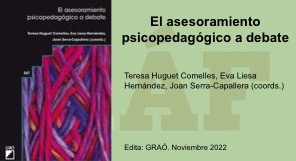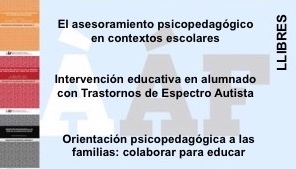Propuesta de un instrumento de evaluación de la teoría de la mente en la infancia
DOI:
https://doi.org/10.32093/ambits.vi51.1417Palabras clave:
Teoría de la mente, Infancia, Evaluación, InstrumentoResumen
La Teoría de la mente (TM) es la capacidad humana de comprender los estados mentales de las personas, que nos permite entender y anticipar su comportamiento, y que por tanto, tiene implicaciones importantes en su socialización. Aunque en la actualidad existen algunos instrumentos para evaluar esta capacidad, ninguno de ellos considera la evolución de sus principales hitos evolutivos desde los más básicos hasta los más avanzados. En este sentido, se presenta el Instrumento de Evaluación de la TM (IATM), una herramienta consistente en 17 tareas basadas en la literatura científica previa, que ha sido pensado para ayudar a los psicólogos y psicopedagogos a detectar aquellos aspectos de la TM con los que los niños de 3 a 12 años pueden tener dificultades. Así pues, es un instrumento para la detección de dificultades de comprensión social que pretende contribuir al diseño de intervenciones educativas ajustadas a las dificultades específicas de los niños y niñas.
Citas
Baron-Cohen, S. (2000). Theory of mind and autism: A review. International Review of Research in Mental Retardation, 23, 169-184.
Björklund, D.F. (2011). Children’s Thinking. Cognitive Development and Individual Differences. Belmont: Wadsworth, Cengage Learning.
Burnel, M., Perrone-Bertolotti, M., Reboul, A., Baciu, M., iDurrleman, S. (2018). Reducing the language content in ToM tests: A developmental scale. Developmental psychology, 54(2), 293.
Carpendale, J., i Lewis, C. (2006). How children develop social understanding. Blackwell Publishing.
Devine, R. T., i Hughes, C. (2014). Relations between false belief understanding and executive function in early childhood: A meta‐analysis. Child Development, 85, 1777-1794.
Doherty, M. J. (2009). Theory of Mind: How Children Understand Others’ Thoughts and Feelings. USA i Canadà: Psychology Press.
Feinfield, K. A., Lee, P. P., Flavell, E. R., Green, F. L., i Flavell, J. H. (1999). Young children's understanding of intention. Cognitive Development,
14(3), 463-486.
Hickling, A. K., Wellman, H. M., i Gottfried, G. M. (1997). Preschoolers' understanding of others' mental attitudes towards pretend happenings.
British Journal of Developmental Psychology, 15(3), 339-354.
Hiller, R. M., Weber, N., i Young, R. L. (2014). The validity and scalability of the Theory of Mind Scalewith toddlers and preschoolers. Psychological assessment, 26(4), 1388.
Nilsson, K. K., i de Lopez, K. J. (2016). Theory of mind in children with specific language impairment: A systematic review and meta‐analysis. Child Development, 87(1), 143-153.
O’Hare, A. E., Bremner, L., Nash, M., Happé, F., i Pettigrew, L. M. (2009).A clinical assessment tool for advanced theory of mind performance in 5
to 12 year olds. Journal of Autism and Developmental Disorders, 39(6), 916-928.
Osterhaus, C., Koerber, S., i Sodian, B. (2016).Scaling of advanced theory-of-mind tasks. Child Development, 87(6), 1971–1991.
Peterson, C. C., Wellman, H. M., i Liu, D. (2005). Steps in theory‐of‐mind development for children with deafness or autism. Child development, 76(2), 502-517.
Pons, F. i Harris, P. (2000).Test of Emotion Comprehension – TEC. Oxford: University of Oxford.
Pons, F., Harris, P. L., i de Rosnay, M. (2004). Emotion comprehension between 3 and 11 years: Developmental periods and hierarchical organization. European Journal of Developmental Psychology, 1(2), 127-152.
Pujals, E., Batlle, S., Camprodon, E., Pujals, S., Estrada, X., Aceña, M.,i Pérez-Solá, V. (2016). Brief report: Translation and adaptation of the theory of mind inventory to Spanish. Journal of Autism and Developmental Disorders, 46(2), 685-690.
Sidera, F., Amadó, A., i Serrat, E. (2013). Are you really happy? Children’s understanding of real vs. pretend emotions. Current Psychology, 32(1), 18-31.
Sidera, F., Amadó, A., i Martínez, L. (2017). Influences on facial emotion recognition in deaf children. The Journal of Deaf Studies and Deaf Education, 22(2), 164-177.
Sidera, F., Serrat, E., Rostan, C., iSanz-Torrent, M. (2011). Do children realize that pretend emotions might be unreal? The Journal of Genetic Psychology, 172(1), 40-55.
Slaughter, V., Imuta, K., Peterson, C. C., i Henry, J. D. (2015). Meta-analysis of theory of mind and peer popularity in the preschool and early school years. Child Development, 86(4), 1159–1174.
Sutton, J., Smith, P., i Swettenham, J. (1999). Social cognition and bullying: Social inadequacy or skilled manipulation? British Journal of Developmental Psychology, 17, 435 – 450.
Sullivan, K., Zaitchik, D., i Tager-Flusberg, H. (1994). Preschoolers can attribute second-order beliefs. Developmental Psychology, 30(3), 395.
Talwar, V., i Lee, K. (2008). Social and cognitive correlates of children’s lying behaviour. Child development, 79(4), 866-881.
Tomasello, M. (2000). The social-pragmatic theory of word learning. Pragmatics. Quarterly Publication of the International Pragmatics Association (IPrA), 10(4), 401-413.
Walle, E. A., i Campos, J. J. (2014). The development of infant detection of inauthentic emotion. Emotion, 14(3), 488.
Wellman, H. M., Cross, D., i Watson, J. (2001). Meta‐analysis of theory‐of‐mind development: The truth about false belief. Child development, 72(3), 655-684.
Wellman, H. M., i Liu, D. (2004). Scaling of theory‐of‐mind tasks. Child development, 75(2), 523-541.
Wellman, H.M. (2014). How Theory of Mind Develops. Oxford: University Press
Wellman, H.M. (2016). Cognición social y educación: teoría de la mente. Pensamiento Educativo. Revista de Investigación Educacional Latinoamericana, 53(1), 1-23
Westby, C i Robinson, L. (2014). A developmental perspective for promoting theory of mind. Topics in Language Disorders, 34(3), 362-382.

Descargas
Publicado
Número
Sección
Licencia
Los autores/as conservan los derechos de autor y conceden a la revista el derecho de primera publicación de la obra, registrada bajo una licencia Creative Commons Reconeixement-NoComercial-Sense Obra Derivada. Esta licencia permite la descarga de las obras y que se puedan compartir con otros siempre que se reconozca la autoría, pero no permite que se modifiquen de ninguna forma ni ser utilizadas con finalidad comercial.














